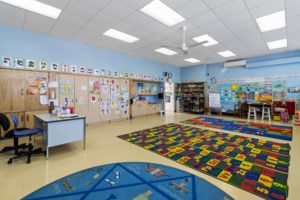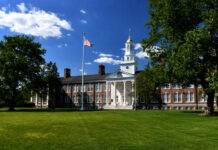
An Aug. 11 ABC News headline read, “US has 300,000 teacher, school staff vacancies.” A July headline from The Philadelphia Inquirer called Pennsylvania’s teacher shortage a “crisis” that will require “thousands of educators by 2025.”
But the same problem is not quite hitting Philadelphia-area Jewish day schools.
Institutions like the Jack M. Barrack Hebrew Academy (6-12) in Bryn Mawr, the Perelman Jewish Day School (pre-K-5) in Montgomery County and the Kellman Brown Academy (pre-K-8) in Voorhees, New Jersey, are, for the most part, fully staffed for the 2022-’23 school year.
Some local schools, like Kellman Brown, which had to fill 11 vacancies, did a lot of work over the summer to be ready by the end of it. Others, though, like the Abrams Hebrew Academy (pre-K-8) in Yardley, barely saw any turnover. Abrams needed to replace just two teachers.
Administrators said they felt lucky that they did not have to deal with the teacher shortage to the same degree as other schools. But they also said that teachers feel seen at their institutions.
“They have say in curriculum; they have say in discipline; they have say in everything,” said Rabbi Ira Budow, the head of school at Abrams. “I welcome their opinions.”
“Perelman is just an incredible place to be. Teachers recognize that,” added Mitchell Daar, Perelman’s new head of school who took over on July 1. “They are valued and a strong part of the community.”
While Budow only had two vacancies to fill, Daar had six. But his team saw 10 or more applicants for the average position and finished its hiring process between the end of July and beginning of August. Certain candidates were not qualified for interviews, he said, but most were.
Barrack Head of School Marshall Lesack described “a bit of a challenged environment when you’re looking for certain people or positions.” Unlike at Perelman, Barrack saw slightly fewer candidates than in years past. Luckily for Lesack and the administration, though, the “vast majority” of staff members are back for 2022-’23, and the new staffers are qualified.
“If you’re able to bring in somebody great, it doesn’t matter if it’s one person who applied or 10 people who applied,” he said.
But for Rachel Zivic, the head of school at Kellman Brown, finding great candidates has required her to work almost every day this summer. Most of her staff is returning, but KBA has grown by about 60 students over the past two years. To keep up with that growth, Zivic needed to find 11 new teachers.
She reached out to camp directors, alumni and current staff members, all to network her way to a full team. KBA interviewed “quite a few teachers,” Zivic said, and, by the middle of August, it had no more openings. The head of school took just three days off during the almost summer-long process.
“Making sure we have enough staff and an excellent staff is the biggest priority,” she said.
Besie Katz, the head of school at the Politz Hebrew Academy (K-8) in Philadelphia, faced a similar challenge. She described it as an entire season of “recruiting, replacing, reevaluating and rescheduling.” But she also reached mid-August with close to a full roster, with just one opening remaining.

For Katz, the biggest difference between this summer and a normal hiring season has been the smaller candidate pool. This allowed certain candidates into the process who would not have been considered in the past.
One told Katz that she had been a student, and so how hard could teaching be? Another did not speak English. A third said she was a waitress who liked to read books.
“This year, I had people who weren’t connected to the profession,” Katz said.
Of course, those candidates did not end up landing positions. Politz’s seven new teachers are very much “connected to the profession.”
“Our children will be in good hands,” Katz said.
Administrators are hoping that the summer proves more stressful than the actual year. For the first time since 2019-’20, there are minimal COVID concerns going into September.
Local day schools are no longer requiring masks and social distancing. They also are no longer limiting activities. Students will need to stay home if they test positive for COVID; but in pre-COVID times we just called that a sick day.
Daar mentioned that he has a medical advisory team that he will consult on an as-needed basis. But right now, there is no need.
“We’re looking forward to running a school that programmatically resembles what it was like prior to the pandemic,” he said. JE






